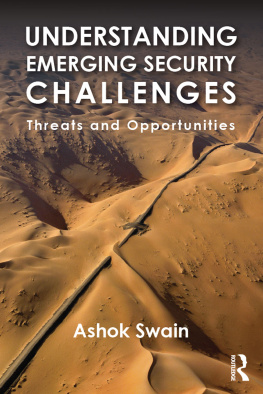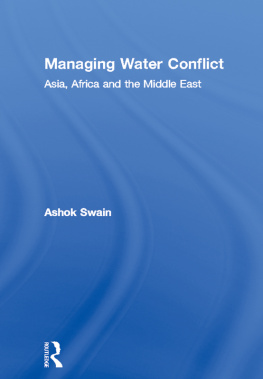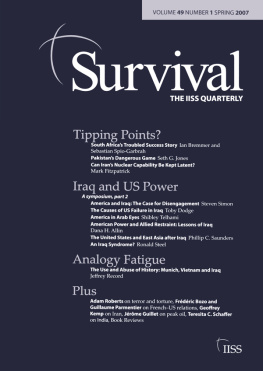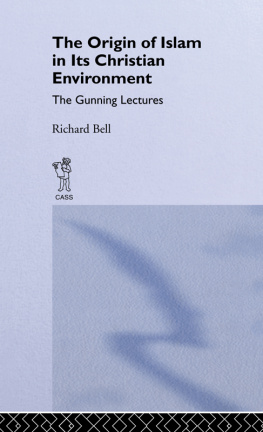I SLAM AND V IOLENT S EPARATISM
Political demands for autonomy and independence by radicalized ethnic groups have recently intensified as a result of the globalization of the post-Cold War world. In addition to facing the challenges posed by democratization, development and social movements, governments everywhere are striving to manage and contain political Islam. This is particularly true in Southeast Asia, where the violence and instability caused by Islamic radical groups have affected the consolidation of liberal democracy in the region. This volume examines the roles of the state and of civil society in three of the new democracies in Southeast Asia the Philippines, Thailand and Indonesia. Focussing on the way these democracies address the increased threat posed to their nation-building projects by political Islam, Islam and Violent Separatism makes an important contribution to the understanding of new security risks, terrorism, democratic consolidation and contemporary Southeast Asian politics.
The Editor
Professor Ashok Swain is the Professor of Peace and Conflict Research, at Uppsala University, Sweden, where he also directs the universitys Program of International Studies and coordinates the universitys Southeast Asian Program. Professor Swain teaches on and researches into new challenges to global security; environmental politics; population migration issues; conflict and cooperation over resource sharing; democratic consolidation and security in Asia, and has written widely on these subjects. Professor Swain is the Coordinator for the Swedish Network of Peace, Conflict and Development Research, and has been a Visiting Researcher, Fellow and Professor at universities around the world.
First published in 2007 by Kegan Paul.
This edition first published in 2009 by
Routledge
2 Park Square, Milton Park, Abingdon, Oxon, OX14 4RN
Simultaneously published in the USA and Canada
by Routledge
270 Madison Avenue, New York, NY 10016
Routledge is an imprint of the Taylor & Francis Group, an informa business
Ashok Swain 2007
All rights reserved. No part of this book may be reprinted or reproduced or utilised in any form or by any electronic, mechanical, or other means, now known or hereafter invented, including photocopying and recording, or in any information storage or retrieval system, without permission in writing from the publishers.
British Library Cataloguing in Publication Data
A catalogue record for this book is available from the British Library
ISBN 10: 0710313322
ISBN 13: 9780710313324
Publishers Note
The publisher has gone to great lengths to ensure the quality of this reprint but points out that some imperfections in the original copies may be apparent. The publisher has made every effort to contact original copyright holders and would welcome correspondence from those they have been unable to trace.
T ABLE OF C ONTENTS
A SHOK S WAIN
S UWIT L AOHASIRIWONG AND A NG M ING C HEE
A YESAH U Y A BUBAKAR
K AMARULZAMAN A SKANDAR
J ONATHAN H ALL
In the post-Cold War world, globalization has heightened the propensity of politicized ethnic groups to make political demands for autonomy and independence. Besides the issues of democratization, development, and social movements, at the dawn of the twenty-first century, governments from North Africa to Southeast Asia are grappling to manage and contain political Islam. Rising violence and instability caused by the Islamic radical groups have certainly affected the consolidation of liberal democracy in Southeast Asia. This volume studies the role of the state and civil society in three of the new democracies in Southeast Asia focussing on the way they are responding to the increased challenges posed by political Islam to their nation-building projects.
This book is one of the outputs of ongoing academic cooperation between the Department of Peace and Conflict Research, Uppsala University, Sweden, and the Unit for Research and Education for Peace, Universiti Sains Malaysia (USM) Penang, Malaysia. With the help of funding from the Asian-Swedish Research partnership Program of the Swedish Research Council, an authors workshop was organized at Uppsala in May 2005. I thank all the contributors to this book for writing their chapters and making the necessary revisions. Special thanks are due to Joop de Haan and Jonathan Hall for helping me to edit this volume. I am also grateful for the support and encouragement of my colleagues, Ramses Amer, Niklas Swanstrm, and Peter Wallensteen to successfully coordinate this research link project with Southeast Asian institutions. Finally, thanks to my wife, Ranjula, my son, Kabir, and my daughter, Simran, for their unceasing patience when I spend way too much time on my computer.
Ashok Swain
Uppsala, Sweden
Ang Ming Chee is a Researcher at the Institute for Dispute Resolution at Khon Kaen University, Thailand.
Ayesah Uy Abubakar is a Researcher at the Unit for Research and Education for Peace, Universiti Sains Malaysia (USM), Penang, Malaysia.
Kamarulzaman Askandar is Associate Professor and Coordinator of the Unit for Research and Education for Peace, Universiti Sains Malaysia (USM), Penang, Malaysia.
Jonathan Hall is a Research Assistant (MA) at the Department of Peace and Conflict Research, Uppsala University, Sweden.
Suwit Laohasiriwong is Professor and Director of the Institute for Dispute Resolution at Khon Kaen University, Thailand.
Ashok Swain is Professor of Peace and Conflict Research, Uppsala University, Sweden, and Coordinator of the Swedish Network of Peace, Conflict and Development Research.
A SHOK S WAIN
Violent ethnic conflict has become one of the most important threats to global peace. It has replaced ideological competition as the main source of strife within and between nation-states.1 After the collapse of Soviet Union, a number of ethnic struggles turned violent, and this trend has for the most part continued since then. There is much controversy over the causes of ethnic conflict. It is a fact that the definition of ethnicity still remains one of the most contested issues in social science. Partly due to this definitional problem, there are several perspectives on how ethnicity relates to group conflict. According to primordialists, for whom human societies are virtually collections of tribes,2 conflicts among ethnic groups in pluralist societies occur as a result of competition over resources. On the other hand, the epiphenomenalist approach, based on Marxist tradition, argues that ethnicity is an incidental appearance, which hides the identity of some class groupings fighting for political and economic power.3 The instrumentalists (alternatively known as structuralists), in using the ascriptive approach, make an attempt to bring together primordialists and epiphenomenalists, and argue that ethnic groups can exist but it does not necessarily lead to social action without the involvement of political community acting as identity entrepreneurs.4
The ascriptive approach of instrumentalists faces criticism from ethnic activists as well as the proponents of class struggle. However, this approach helps to analyze ethnicity as a causative variable, not as the total explanation of the projects designed to capture state power or to control a new territory. There are nearly 200 states in the world; only a few of them are really ethnically homogeneous and the rest bear the burden of being culturally diverse. More than 4000 ethno-cultural groups reside in these nation states: countries such as Finland, Belgium, Canada, Lebanon, Fiji, Thailand and the Philippines are ethnically bipolar while India has more than 100 of such groups. Pluralism from one country to another varies in terms of the number of ethnic groups, their size, history and the depth of their cultural and racial differences and commonalities. Similarly, the relation between ethnic groups from one country to another differs from domination and genocide to many forms of accommodation and sharing.5






